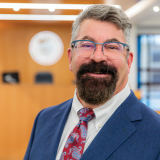
Fowler Law Professor John Eastman Publishes Article in New York University Journal of Law & Liberty
September 30, 2016
Chapman University Dale E. Fowler School of Law Professor John Eastman’s article “No Free Lunch, but Dinner and a Movie (And Contraceptives for Dessert)?” was recently published in Volume 10, Number 7 of the New York University Journal of Law & Liberty.
From the abstract:
The focus of the Supreme Court’s 2015 decision in Burwell v. Hobby Lobby, Inc. and on its related progeny, the 7 Little Sisters of the Poor cases on which the Court punted in 2016, was on whether privately-held corporations can avail themselves of the religious liberties protections contained in the federal Religious Freedom Restoration Act in order to exempt themselves from the mandate that they provided free contraceptive and abortifacient coverage to their employees. This article defends the correctness of the Supreme Court’s Hobby Lobby decision, but then explores more fundamental and antecedent questions implicated by the case. First, because the contraceptive (and abortifacient) mandate that created the religious liberty problem was a creature of administrative regulation that both exceeded the “preventive care” text contained in the Affordable Care Act statute and accomplished an end that was specifically disavowed by the sponsor of that text, were the regulations themselves even valid? And second, by what authority does Congress (or, in this case, the Department of Health and Human Services) mandate that the property of “A” (the Hobby Lobby owners) can be taken and given to “B” (the individual employees). Doesn’t such a raw transfer of property from one private individual to another for the private benefit of the latter violate “the great first principle of the social compact”? In the landmark case of Calder v. Bull, Justice Chase strongly noted that it would. Indeed, he would not even deign to call such a thing “law,” because it could not “be considered a rightful exercise of legislative authority.” Has our understanding of the very purpose of legitimate government been so dramatically transformed in the intervening two centuries that we can hardly even recognize that great principle of the social compact, much less give it effect?
Dr. John C. Eastman is the Henry Salvatori Professor of Law & Community Service at Chapman University Fowler School of Law, and also served as the School’s Dean from June 2007 to January 2010, when he stepped down to pursue a bid for California Attorney General. Professor Eastman is also affiliated with the Claremont Institute as a Senior Fellow and Director of the Institute’s Center for Constitutional Jurisprudence, which sponsors Chapman’s Constitutional Jurisprudence Clinic. Prior to joining the Fowler School of Law faculty in August 1999, he served as a law clerk with Justice Clarence Thomas at the Supreme Court of the United States and with Judge J. Michael Luttig at the United States Court of Appeals for the Fourth Circuit. After his clerkships, Dr. Eastman practiced with the national law firm of Kirkland & Ellis, specializing in major civil and constitutional litigation at both the trial and appellate levels. He earned his JD from the University of Chicago Law School, where he graduated with high honors in 1995. He was a member of the Order of the Coif and University of Chicago Law Review, a Bradley Fellow for Research in Constitutional History, and an Olin Fellow in Law & Economics. Dr. Eastman also has a Ph.D. and M.A. in Government from the Claremont Graduate School, with fields of concentration in Political Philosophy, American Government, Constitutional Law, and International Relations. He has a B.A. in Politics and Economics from the University of Dallas. Prior to law school, he served as the Director of Congressional & Public Affairs at the United States Commission on Civil Rights during the Reagan administration and was the 1990 Republican Nominee for Congress in California’s 34th District.

